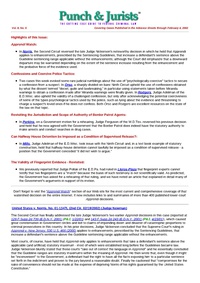United States v. Orso, 275 F.3d 1190 (9th Cir. 2001) (En Banc) (Per Curiam)
United States v. Rodgers, No. 01-CR-37 (E.D.Wisc. 02/08/2002) (Judge Adelman)
Both of these cases dealt with some of the psychologically coercive tactics used by the police in obtaining confessions from suspects; and, while the confessions …
The Second Circuit has finally addressed the late Judge Nickerson’s two earlier Apprendi decisions in this case (reported at 128 F.Supp.2d 739 (E.D.N.Y. 2001) (P&J, 1/22/01) and 143 F.Supp.2d 243 (E.D.N.Y. 2001) (P&J, 4/23/01)), which caused great consternation in Government circles and led to claims of impending doom and …
In this case, Judge Sweet of the S.D.N.Y. had previously held that parts of the Child Support Recovery Act, as amended by the Deadbeat Parents Punishment Act, were unconstitutional in that they exceeded the scope of Congressional power under the Commerce Clause. Judge Sweet had relied extensively on the …
United States v. Orso, 275 F.3d 1190 (9th Cir. 2001) (En Banc) (Per Curiam)
United States v. Rodgers, 186 F.Supp.2d 971 (E.D.Wisc. Feb. 2, 2002) (Judge Adelman)
Both of these cases dealt with some of the psychologically coercive tactics used by the police in obtaining confessions from suspects; and, …
Here, Judge Adelman took issue with the Ninth Circuit and, in a text book example of statutory construction, held that halfway-house detention cannot lawfully be imposed as a condition of supervised release under 18 U.S.C. § 3583(d).
In this case, taking issue with a decision from the Ninth …
We can just imagine the pressure that was exerted on Judge Furgeson in this case. In September, 2001, he committed major heresy not only by ruling that U.S. Border Patrol agents have limited authority and jurisdiction to make arrests and conduct searches under the drug laws, but also by …
The defendant in this case had previously been granted a downward departure when the district court, relying in the Third Circuit's decision in U.S. v. Smith, 186 F.3d 290 (3rd Cir. 1999), concluded that his conduct fell outside the "heartland" of the money laundering Guidelines. On appeal, that departure …
On an issue of first impression in the Third Circuit (but one which has divided the other Circuits) the court held that despite the “should” language Section 5G1.3(c) of the Sentencing Guidelines and the accompanying Application Note 6, the Guidelines do not mandate that a sentencing court impose consecutive …
